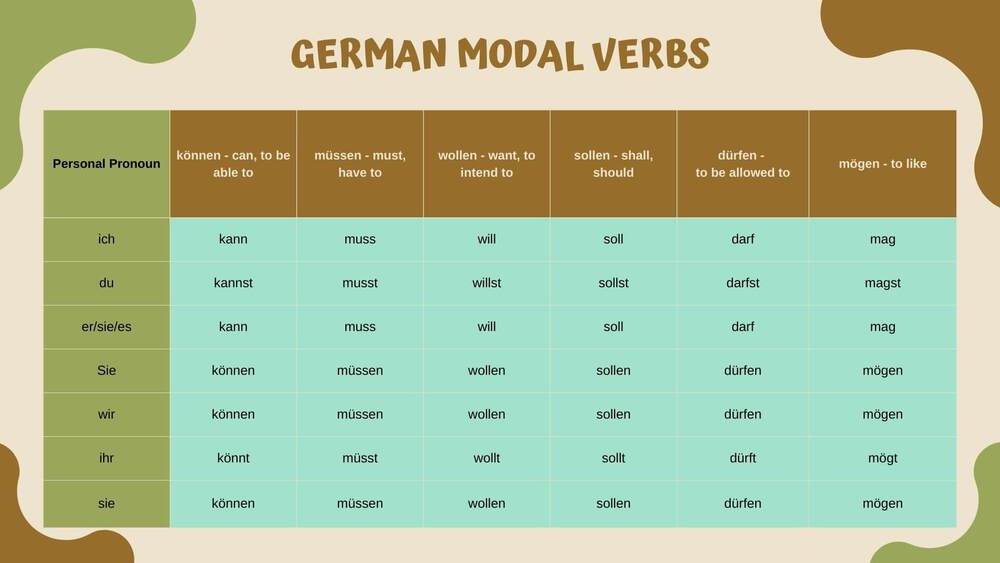Table of Contents
Introduction
German modal verbs help speakers express ability, permission, necessity, desire, and preference. By learning these verbs, learners gain stronger control over German sentences. This guide presents their basic forms, meanings, and common examples.
What Are Modal Verbs?

German modal verbs modify the meaning of main verbs. They appear with another verb in its infinitive form. The six main German modal verbs are:
- müssen = must, have to
- können = can, be able to
- wollen = want to
- sollen = should, supposed to
- dürfen = may, be allowed to
- mögen = like
These verbs give learners a direct way to state needs, skills, wishes, rules, and likes. For extra practice, try this quiz:
German Modal Verbs Quiz.
Sentence Structure with Modal Verbs
In German main clauses, the modal verb often goes in the second position, and the main verb stays in the infinitive at the end. In subordinate clauses, the conjugated modal verb usually moves to the end, after the infinitive.
I. Main Clauses
Pattern: Subject – Modal Verb – Other Words – Main Verb (infinitive)
Example Sentences in Main Clauses
- Du kannst gut singen. (You can sing well.)
- Wir sollen heute lernen. (We should study today.)
- Sie will einen Tee trinken. (She wants to drink tea.)
II. Subordinate Clauses
Pattern: … dass/wenn/weil … Subject – Other Words – Main Verb (inf.) – Modal Verb (conjugated)
Example Sentences in Subordinate Clauses
- Ich weiß, dass du Deutsch sprechen kannst. (I know that you can speak German.)
- Sie sagt, dass wir gehen dürfen. (She says that we may go.)
- Er denkt, dass du helfen sollst. (He thinks that you should help.)
Können (can, be able to)
Meaning
“Können” shows ability or possibility.
Conjugation of “können” in Present Tense
| ich | kann |
| du | kannst |
| er/sie/es | kann |
| wir | können |
| ihr | könnt |
| Sie/sie | können |
Example Sentences (Present)
- Ich kann Deutsch verstehen. (I can understand German.)
- Du kannst das Buch lesen. (You can read the book.)
- Wir können schnell laufen. (We can run fast.)
Conjugation of “können” in Simple Past
| ich | konnte |
| du | konntest |
| er/sie/es | konnte |
| wir | konnten |
| ihr | konntet |
| Sie/sie | konnten |
Example Sentences (Past)
- Ich konnte gestern nicht kommen. (I could not come yesterday.)
- Sie konnten das Problem lösen. (They could solve the problem.)
Müssen (must, have to)
Meaning
“Müssen” shows a strong need or requirement.
Conjugation of “müssen” in Present Tense
| ich | muss |
| du | musst |
| er/sie/es | muss |
| wir | müssen |
| ihr | müsst |
| Sie/sie | müssen |
Example Sentences (Present)
- Ich muss jetzt gehen. (I must go now.)
- Wir müssen hart arbeiten. (We must work hard.)
Conjugation of “müssen” in Simple Past
| ich | musste |
| du | musstest |
| er/sie/es | musste |
| wir | mussten |
| ihr | musstet |
| Sie/sie | mussten |
Example Sentences (Past)
- Ich musste gestern lange arbeiten. (I had to work long hours yesterday.)
- Sie mussten früh aufstehen. (They had to wake up early.)
Wollen (want to)
Meaning
“Wollen” shows desire or intention.
Conjugation of “wollen” in Present Tense
| ich | will |
| du | willst |
| er/sie/es | will |
| wir | wollen |
| ihr | wollt |
| Sie/sie | wollen |
Example Sentences (Present)
- Ich will mehr lernen. (I want to learn more.)
- Sie wollen heute reisen. (They want to travel today.)
Conjugation of “wollen” in Simple Past
| ich | wollte |
| du | wolltest |
| er/sie/es | wollte |
| wir | wollten |
| ihr | wolltet |
| Sie/sie | wollten |
Example Sentences (Past)
- Ich wollte gestern ein Buch lesen. (I wanted to read a book yesterday.)
- Wir wollten zusammen kochen. (We wanted to cook together.)
Sollen (should, supposed to)
Meaning
“Sollen” suggests advice or expectation.
Conjugation of “sollen” in Present Tense
| ich | soll |
| du | sollst |
| er/sie/es | soll |
| wir | sollen |
| ihr | sollt |
| Sie/sie | sollen |
Example Sentences (Present)
- Ich soll mehr trinken. (I should drink more.)
- Ihr sollt helfen. (You should help.)
Conjugation of “sollen” in Simple Past
| ich | sollte |
| du | solltest |
| er/sie/es | sollte |
| wir | sollten |
| ihr | solltet |
| Sie/sie | sollten |
Example Sentences (Past)
- Ich sollte früher kommen. (I should have come earlier.)
- Sie sollten mehr lernen. (They should have studied more.)
Dürfen (may, be allowed to)

Meaning
“Dürfen” expresses permission.
Conjugation of “dürfen” in Present Tense
| ich | darf |
| du | darfst |
| er/sie/es | darf |
| wir | dürfen |
| ihr | dürft |
| Sie/sie | dürfen |
Example Sentences (Present)
- Ich darf heute lange bleiben. (I may stay long today.)
- Du darfst das Zimmer betreten. (You may enter the room.)
Conjugation of “dürfen” in Simple Past
| ich | durfte |
| du | durftest |
| er/sie/es | durfte |
| wir | durften |
| ihr | durftet |
| Sie/sie | durften |
Example Sentences (Past)
- Ich durfte gestern ins Kino gehen. (I was allowed to go to the cinema yesterday.)
- Wir durften das Museum besuchen. (We were allowed to visit the museum.)
Mögen (to like)
Meaning
“Mögen” expresses a general liking.
Conjugation of “mögen” in Present Tense
| ich | mag |
| du | magst |
| er/sie/es | mag |
| wir | mögen |
| ihr | mögt |
| Sie/sie | mögen |
Example Sentences (Present)
- Ich mag Schokolade. (I like chocolate.)
- Sie mögen Musik. (They like music.)
Conjugation of “mögen” in Simple Past
| ich | mochte |
| du | mochtest |
| er/sie/es | mochte |
| wir | mochten |
| ihr | mochtet |
| Sie/sie | mochten |
Example Sentences (Past)
- Ich mochte den Film. (I liked the film.)
- Wir mochten das Essen. (We liked the food.)
Möchten (Would like) – Konjunktiv II of “Mögen”
Meaning
“Möchten” expresses a polite wish.
Conjugation of “möchten”
| ich | möchte |
| du | möchtest |
| er/sie/es | möchte |
| wir | möchten |
| ihr | möchtet |
| Sie/sie | möchten |
Example Sentences with “möchten”
- Ich möchte einen Kaffee. (I would like a coffee.)
- Möchtest du mitkommen? (Would you like to come along?)
Modal Verbs in Other Tenses
You can use modal verbs with perfect or future tenses. This form often appears in written text. In perfect tenses, use a form of “haben” plus two infinitives (main verb + modal). In the future tense, use “werden” plus two infinitives.
Examples (Perfect)
- Ich habe gehen müssen. (I have had to go.)
- Wir haben helfen können. (We have been able to help.)
Examples (Future)
- Ich werde mehr lernen müssen. (I will have to learn more.)
- Sie wird kommen wollen. (She will want to come.)
Replacement Forms
Instead of using modal verbs directly, you can use phrases like “in der Lage sein” (be able) for “können” or “die Erlaubnis haben” (have permission) for “dürfen.” These forms can make sentences more varied.
Examples
- Sie ist in der Lage, gut zu schreiben. (She can write well.)
- Wir haben die Erlaubnis zu gehen. (We are allowed to go.)
Passive with Modal Verbs
How Passive Works with Modal Verbs
In German, passive voice can be combined with modal verbs to express actions that must, can, or should be done. This structure highlights the action itself rather than who performs it. The most common tenses for this construction are present tense (Präsens) and simple past (Präteritum).
Structure in Present Tense
- Subject + modal verb (conjugated) + past participle + werden (infinitive)
Examples:
- Das Fenster muss geschlossen werden. → The window must be closed.
- Die Aufgaben können schnell erledigt werden. → The tasks can be completed quickly.
- Der Fehler soll sofort behoben werden. → The mistake should be fixed immediately.
Structure in Simple Past
- Subject + modal verb (past form) + past participle + werden (infinitive)
Examples:
- Die Rechnung musste bezahlt werden. → The bill had to be paid.
- Das Problem konnte gelöst werden. → The problem could be solved.
- Die Gäste durften nicht hereingelassen werden. → The guests were not allowed to enter.
For a detailed guide on how to use passive with modal verbs in different tenses, see the German Passive with Modal Verbs Guide.
German Modal Verbs Quiz
Practice with quizzes to gain confidence:
German Modal Verbs Quiz.
Conclusion
German modal verbs let speakers express many key ideas. With these verbs, learners can show what they can do, must do, want to do, should do, may do, and like to do. By studying their forms and practicing their use, learners develop clear and direct sentences.
FAQ
Where is the Modal Verb placed?
The modal verb stands in a main clause at the 2nd position, and in a subordinate clause at the end of the sentence.
What is the difference between “mögen” and “möchten”?
“Mögen” means “to like.” “Möchten” means “would like”.
Can I use modal verbs in all tenses?
Yes, but mostly the present and simple past tenses are used.
Are replacement forms common?
They appear in formal or written contexts, adding variety to expressions.
How do I improve with modal verbs?
Practice often, read examples, and try quizzes or exercises.

